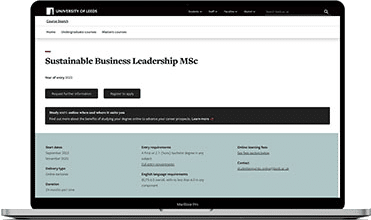How to Develop the Skills for Sustainability Manager Roles
Sustainable Business Leadership
The number of careers in sustainability management continues to grow in a variety of sectors including technology, healthcare, and finance as 37% of global boardrooms now operate with a Chief Sustainability Officer.
From critical thinking to problem-solving, a broad range of specialist knowledge and skills is required to solve business sustainability challenges and succeed in a complex landscape.
In this blog, we explore five of the most important sustainability leadership skills and reveal how you can develop them through our unique online Masters/Postgraduate Certificate (PGCert).
Learn more about our Sustainable Business Leadership courseTop 5 sustainability manager skills
1. Critical thinking
The ability to think critically and make well-informed decisions is one of several crucial skills needed for sustainability.
Any professional working in a sustainability leadership role must be able to identify areas of improvement in their organisation by considering the internal and external challenges impacting their business goals. Following this, they will need to leverage their findings and use their skills to creatively convert ideas into actions and deliver upon them to support business goals and improve the impact they have on the world.
By using sustainability frameworks and tools to develop strategies, guide the organisation, and optimise operational practices, they will be able to overcome a variety of social, legal, economic and political challenges linked to sustainability.
2. Complex decision making
Competing demands from various stakeholders often makes decision-making in sustainability and environmental management roles complex, as competing demands arise from the interests of different people. For example, activists’ desire to enhance and invest in environmental performance and policies may be at odds with shareholders’ directive to minimise costs.
For sustainability managers, the ability to navigate this, influence the behaviours of others and make smart individual and group decisions is essential to success.
Learn more about our Decision Making in a Complex World module
3. Communication and collaboration
Good working relationships are key to performance and productivity in all organisations and every role, but the ability to effectively communicate and collaborate with global stakeholders is particularly important for sustainability leadership.
Organisations need to engage customers, employees and other stakeholders in their sustainability strategies and environmental performance. And this requires leaders who can effectively communicate their company’s commitment to achieving such goals.
Similarly, businesses will need sustainability managers to collaborate with other functions such as marketing to publicise sustainability initiatives, and external pressure groups to address any public concerns.
4. Project management
Addressing challenges to the environment and sustainability is time-critical and requires rapid solutions. It therefore goes without saying that project management is ranked highly as one of the top skills needed for sustainability.
There are lots of ways that sustainability is becoming an important issue for organisations, but they must also find ways to incorporate this into existing strategies.
Take environmental management (e.g., tackling climate change) and diversity and inclusion initiatives for example. They are arguably just as important as each other, but if you were tasked with implementing both at the same time, how would you balance this and make sure that they are equally addressed?
This example emphasises why sustainability managers need good project management skills. They must be able to prioritise such tasks and deliver solutions in a timely manner.
5. Analytical skills
So, we’ve explored how important it is for leaders to think critically about sustainable solutions, make tough decisions, communicate clearly, and manage multiple projects and commitments. But when concluding each sustainability initiative, results must be gathered and examined. This brings analytics into our top five skills needed for sustainability.
In sustainability leadership, it’s essential to have good analytical skills to truly pinpoint and show the impact that innovative approaches are having on businesses. With the support of sustainability frameworks and tools, this data can then be used by leaders to evaluate the benefits and limitations of a variety of sustainability issues from work and economic growth to reduced inequalities.
Develop your sustainability leadership skills with the University of Leeds
Ready to enhance your knowledge and skills for a successful career in sustainability?
Our online Sustainable Business Leadership Masters/Postgraduate Certificate (PGCert) draws on sustainability techniques, concepts, and analytical skills to help you problem-solve and communicate solutions to complex business issues.
The course is a result of a collaboration between Leeds University Business School and the School of Earth and Environment at the University of Leeds. You’ll gain the skills that employers are actively seeking by learning how to develop sustainable business strategies to transition to a more sustainable economy, whilst effectively leading on change strategies, in your organisation.
Take control of your learning, study online and thrive in your career with an online Masters from the University of Leeds.
“We’re at a crucial juncture where we must shake things up and we can’t just continue as we are, so this programme aims to develop skills and knowledge, but also the values that students and business leaders need to meet the pressing sustainability challenges that we’re facing.”

Did you enjoy this blog? Here’s some related sustainability content that you may be interested in:

Want to learn more about our online Sustainable Business Leadership course?
Check out the course content and how to apply.

